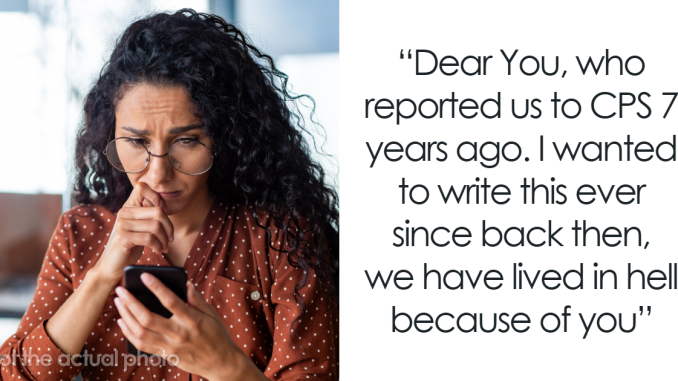
Many parents share photos of their children online, whether to proudly show off their bundle of joy or to keep friends and family in the loop during some of the most important moments. However, something that they might not realize while doing so is that excessive posting of pictures or information about a child’s life can often come with certain risks.
These parents also didn’t consider them when they started sharing their daughter’s eating disorder online for everyone to see. Fortunately, their ex-sister-in-law took action to stop them from posting the girl’s sensitive information, which they weren’t particularly happy about.
Sharing children’s information online come with serious risks
Image credits: YuriArcursPeopleimages (not the actual photo)
However, these parents didn’t care about them when they shared their daughter’s eating disorder online
Image credits: imagesourcecurated (not the actual photo)
Image credits:Pressmaster (not the actual photo)
Image credits: voronaman111 (not the actual photo)
Image source: Ginnyweed
27% of parents have made their children’s inappropriate photos public
Image credits: Getty Images (not the actual photo)
It’s common for parents to think that sharing children’s moments online is allowing them to create a digital photo album and connect with their friends and family. However, in reality, what they’re doing is creating a kid’s digital footprint that can be accessed by anyone. Nowadays, for an average child, the creation of their digital footprint often begins in the womb—before they’re even born, when parents share photos of their ultrasound.
When parents post their children’s photos here and there, it might not pose serious risks. However, when family members frequently share sensitive information about their kids on social media, often without understanding the possible consequences, it can attract unwanted people who could use such data with malicious intent.
This even has its own term—”sharenting,” which is defined by the Cleveland Health Clinic as “the act of digital oversharing, of excessively posting information, pictures, stories or updates about your child’s life.” It can have various negative effects on children, who usually can’t stand up for what information about them is shared online, which will stay there forever.
“Sharenting comes with lots of gray areas regarding a child’s privacy, autonomy, protection, and right to informed consent,” explained psychologist Susan Albers, PsyD. “Some countries have put regulations in place to ensure parents are sharing safely. But we don’t have many laws in the U.S. that protect children online. Everyone has to figure out for themselves when their social media use crosses a line.”
Unfortunately, not everyone understands when that happens. A 2015 survey found that 74% of parents using social media observed sharenting behavior in others. 56% reported that the family shared embarrassing information about their kid, while 51% said the posted information revealed their children’s location. 27% even reported that parents made their children’s inappropriate photos public. Since the survey was completed 10 years ago, it’s very likely that these numbers have grown.
Online exposure can affect children’s mental health and put them in danger
Image credits: Richard Stachmann (not the actual photo)
When a child is exposed to online attention without their consent, it can affect their mental health and even put them in danger. Kids may feel embarrassed and lack a sense of control when their personal information is made public, which can lead to dips in self-esteem and self-worth, damaging their mental well-being in the process. Meanwhile, creating an idealized image of them online can hinder their development and progress.
Making kids’ information public also exposes them to the possibility of online and real-life bullying, identity theft, harassment, online grooming, and even violence. The problem here is that parents don’t know how far the pictures of their children can go once they’re online and how other people might use them.
To avoid any of these consequences, it’s important to be mindful of posting any photos or information about children on social media. Better yet, parents should try to limit their sharing as much as possible. It’s hard to gauge what someone could be able to identify from a picture, so it’s safer to stick to posting photos that don’t have children’s faces in them or any other recognizable details.
“Pose your child so you only see the back of their head. Let your child choose a nickname or an emoji to cover their face with in photos,” advises the Cleveland Health Clinic.
The commenters believed the woman did the right thing by calling CPS on those parents
The post Parents Put Daughter’s Eating Disorder On Display Online, Are Furious After CPS Shows Up first appeared on Bored Panda.
